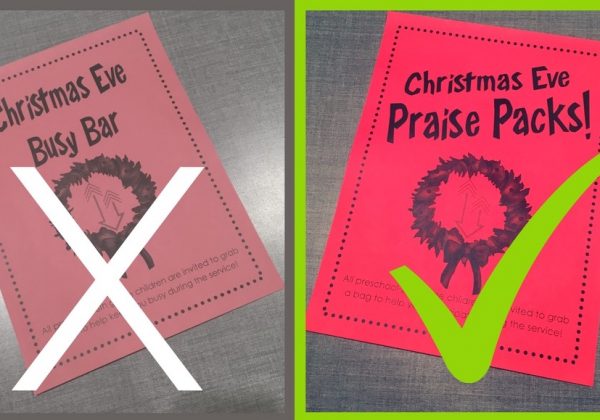
At our Christmas Eve service and at other intergenerational services throughout the year where children attend the service with their parents, I have always created a “Busy Bar” with coloring pages, crayons, and small, quiet toys that kids can pick up to use during the service. But after studying family ministry in a seminary course on reaching families in the 21st century, I realized that my good intentions to promote intergenerational worship were encouraging an opposite mentality.
Diana Garland, a family ministry expert, warns against providing distracting materials for intergenerational services because it unconsciously tells children that they will be bored and encourages them to disengage. While I do my best to relate the toys and activities to the main sermon points, even calling these items a “busy bar” encourages distraction rather than participation for the kids.
Thus, Praise Packs were born.
Praise Packs contain many of the same items as the busy bar, but by framing them as aids to worship rather than distractions for boredom, kids are encouraged to participate in the service as fellow believers rather than noisy guests. Simply by changing the name, I redirected kids’ thoughts about how and if they could participate in the family service.
Then, I started thinking… what other unhealthy mindsets am I unintentionally creating because of a poorly-worded name? How would it change the way volunteers approach serving if I called them partners instead of volunteers? Would kids feel more excitement about church if I called our Sunday mornings “celebrations” rather than “services”? What kind of response would I get if I asked someone to “serve” rather than “work” in the nursery?
What you name your activities and resources can subliminally send messages to the families in your ministry about the expectations of their participation.
So whether you’re naming interactive elements for a family service, your take-home sheets, or even your ministry team, think about how its name will influence the culture and mindset of your families. Change the game by changing the name that will unconsciously foster the culture you want to create.

4 Comments
[…] Don’t call it a “meeting.” You probably aren’t super excited about attending meetings, and your volunteers aren’t either. Whether you call it a training session, a convention, a conference, a summit, a rally, or even a gathering, what you call your training event will subliminally influence a volunteer’s attitude about attending. (This idea applies to kids and families too.) […]
[…] Anytime we have an intergenerational service where children attend with their families, I like to hand out Praise Packs – a goody bag with activities that help kids engage and participate in the service. These are great ways to help alleviate stress for parents who are worried about their child making it through the whole service, but more importantly, they help teach kids that “big church” is for them too. […]
[…] In an interview with Michayla White from the International Network of Children’s Ministry on FaceBook Live (watch it here), I share some ideas for engaging (not just occupying) kids in your services. One of my favorite ways is to provide worship activity bags, which we call Praise Packs! Praise Packs are a goody bag with activities that help kids engage and participate in the service. You could also call them Worship Wiggle Bags, Service Swag, Salvation Sacks, or any other name you can think of that encourages participation! These are great ways to help alleviate stress for parents who are worried about their child making it through the whole service, but more importantly, they help teach kids that “big church” is for them too. […]
[…] before opening the children’s ministry, design your family services with children in mind. Don’t just try to occupy them; engage them. Are there elements of your children’s ministry that you could incorporate into the main […]